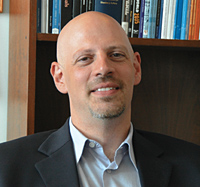Commentary: Benn Tannenbaum
 Photo: Kelly Gayden, AAAS |
The process counts
Particle physics and politics. At first blush, it's hard to imagine two more dissimilar fields of endeavor. Certainly, politicians roam the countryside looking for campaign contributions, and physicists sometimes roam the halls of Congress looking for funding, but are there any real similarities?
I'd like to think so. Take the search for the top quark: Single events here and there were interesting, but not sufficient to make a claim. In the end, it took the analyses of two competing experiments to provide the community with compelling evidence.
Policy is usually formed in a similar fashion. No politician—at least none that wants to get re-elected—carves out a position based on the input of one or two constituents. A politician holds a finger to the wind, talks to informed colleagues, listens to experts, and then decides what to do. It's a process, not an event.
There are exceptions, of course. Lobbyists and campaign contributors can and do sway events in Washington, DC. But the same thing happens in particle physics: Witness the more than one hundred papers that purported to explain a single, unusual event recorded by the CDF experiment in 1995.
Scientists—including physicists—are not average constituents. By remembering that Maxwell's equations are neither liberal nor conservative, that Newton's Laws are the same for Republicans and Democrats, and that the Second Law of Thermodynamics cannot be repealed, physicists can use their knowledge of and insights into the world around us to help the government formulate public policy.
Instead of focusing on politics, which is personal and based on opinions, physicists should focus on policy, which is a combination of facts and values. This is where, I believe, scientists can be most effective: We are "fact people." Get labeled as a member of a political party and you are one of fifty million people on either side of an issue. Get labeled as someone who knows the facts—and their implications—and you are now a member of a much smaller and more useful group.
You can start by working with the people you elect—your Senators, your Representatives, your state and local elected officials—regardless of how much you agree or disagree with them overall. It's highly unlikely that you'll agree with someone all the time, so instead find areas of common interest and work there. There is a limit to the number of times that scientific input can be ignored before real change is demanded—if policy-makers have access to the information.
There are two main ways: public advice and private advice. The public method is one often followed by the American Physical Society's Panel on Public Affairs. They assemble a panel of experts, produce a report, and brief the results to anyone who will listen. Individuals also can shape public opinion—by building relationships with journalists, editors, columnists, and others. This isn't easy, and it requires a great deal of follow-through. Not only do you need to get them the information, you also need to help them understand it; the pace of progress in science is simply too fast for any one journalist to stay current in all fields.
The private method of advice requires building a one-on-one relationship with your Member of Congress and/or his or her staff. Most Members are interested in hearing from constituents, and they are especially keen to hear from faculty at universities located in their districts or states. Pick a topic that is of interest to the Member (based on committee assignments, press releases, etc.; the Member's website is a good source of information) and one to which your expertise is relevant, and write him a letter describing the science. Offer to come to Washington to brief her. Talk to the appropriate staff. Perhaps the most important effort is to try to meet with the Member when she is back in her Congressional district. The goal is to develop a relationship with the staff and the Member so that you are one of the people they call for advice. It's not an easy task, but not an impossible one either. The benefits are both an impact on policy in general, and the ability to be more influential on science funding.
So what about that unusual CDF event? It turned out that it is unclear whether one of the particles observed really is an electron. Events, both in particle physics and politics, aren't always what they seem to be. It's the process—not the event—that is the most important.
Benn Tannenbaum received his PhD in particle physics in 1997. In 2002, he was named American Physical Society Congressional Science Fellow and worked for Representative Edward J. Markey (D-MA) on nonproliferation issues. Today, he is at the Center for Science, Technology and Security Policy (CSTSP) of the American Association for the Advancement of Science. His duties include drafting policy briefs, tracking legislation, and serving as liaison with the security policy community.
Click here to download the pdf version of this article.


